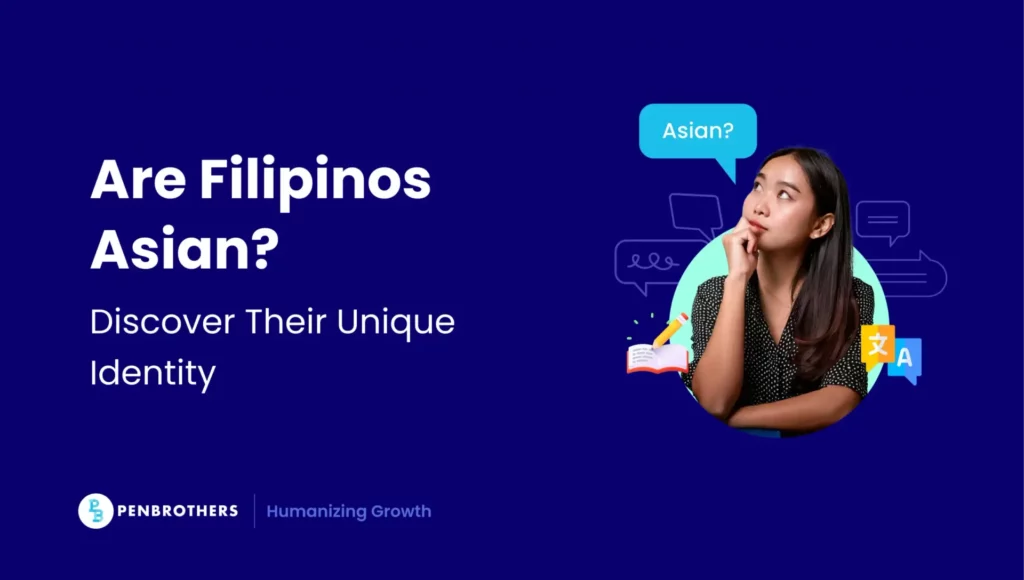Key Takeaways
- Filipinos are Geographically and Ethnically Asian: The Philippines is a Southeast Asian nation and its people are of majority Austronesian descent. This ethnically and culturally links them to neighboring populations in countries like Malaysia and Indonesia.
- Superior English Proficiency is a Key Differentiator: When compared to other major Asian outsourcing hubs like India, China, and Vietnam, the Philippines’ primary competitive advantage is its workforce’s widespread, high-level English proficiency and neutral accent, making it ideal for client-facing roles.
- A Unique Blend of Cultural Strengths Drives Success: Filipino professionals are highly valued for their unique combination of a strong work ethic, a customer-centric attitude rooted in cultural hospitality, and a high degree of adaptability to Western business practices and varying work hours.
- Filipino Identity is Complex and Layered: While Filipinos are Asian, their primary self-identifier is “Filipino,” often with strong regional ties. Similarly, there is no single “Filipino look,” as the population’s appearance reflects a diverse history of Austronesian, Chinese, Spanish, and American influences.
When considering the cultural, geographical, and historical aspects of the Philippines, it’s clear that Filipinos are indeed Asian.
The Philippines is an archipelago located in Southeast Asia, with its 7,000+ islands situated in the Pacific Ocean. The country is geographically part of Asia and is a member of several Asian organizations, including the Association of Southeast Asian Nations (ASEAN).
However, the question of Filipino identity can sometimes seem more complex because the Philippines has a rich and diverse history influenced by many cultures, including Spanish, American, and Chinese. These influences, alongside the Philippines’ indigenous traditions, have shaped Filipino culture in unique ways.
While Filipinos are undoubtedly Asian by geography and many cultural factors, their cultural identity is also a blend of various influences, making them distinct in the wider Asian context.
Here are several key factors that affirm this identity apart from its geographic location:
Cultural and Linguistic Ties
- Language: Filipino, based on Tagalog, belongs to the Austronesian language family, which is spoken across Southeast Asia and the Pacific, connecting Filipinos to their neighbors in Indonesia, Malaysia, and Taiwan.
- Cultural Practices: Filipino culture shares commonalities with other ASEAN nations, such as an emphasis on family and community, as well as shared festivals and traditions like harvest festivals and street dancing.
Ethnic Composition
- Austronesian Heritage: The majority of Filipinos (about 90%) are of Austronesian descent, which ties them ethnically and culturally to other Southeast Asians. This includes connections with populations in Indonesia, Malaysia, and Brunei.
- Asian Influences: The Philippines has historical ties to China and India, with Chinese Filipinos, or Tsinoys, playing a significant role in the country’s economy and culture.
Regional Political Affiliation
As a founding member of ASEAN, the Philippines actively participates in regional affairs, promoting economic cooperation and security. In 2026, the Philippines will host the ASEAN Business and Investment Summit as it continually plays a key role in the East Asia Summit and APEC discussions.
Philippine Identity in Global Context
Filipinos form one of the largest expatriate communities globally, especially in the U.S., Canada, and the Middle East, and are recognized as part of the broader Asian diaspora, particularly in Asian American/Pacific Islander (AAPI) communities in the U.S.
Contemporary Recognition
As of 2023, there are approximately 2 million Filipino immigrants in the United States, classified by the U.S. Census Bureau as part of the Asian ethnic group. Filipino media outlets like ABS-CBN and GMA Network consistently cover regional affairs, underscoring the Philippines’ role in Asia’s geopolitical landscape.
What Do Filipinos Call Themselves?
Filipino. That’s the simple answer. But simple answers rarely tell the whole story.
Walk through Manila and ask people what they are. You’ll hear “Filipino” first. Always. It’s the umbrella term that holds everything together. But listen longer and you’ll hear the layers underneath.
“I’m Cebuano.” “I’m Ilocano.” “I’m Bicolano.” Regional identities run deep. The Philippines has over 180 languages and dialects. Each region carries its own traditions, food, and ways of seeing the world. Being Filipino includes all of these, but doesn’t erase them.
Then there’s “Pinoy” and “Pinay.” Informal terms Filipinos use among themselves. Casual. Friendly. Like an inside joke that became a badge of identity. You’ll see it on social media, hear it in conversations, find it printed on t-shirts. It’s Filipino identity with the formality stripped away.
Some Filipinos abroad call themselves “Fil-Am” or “Filipino-Canadian” or “Filipino-Australian.” Hyphenated identities that acknowledge multiple belongings. They’re Filipino and something else. Both. Neither fully one nor the other, but something new that emerges from living between worlds.
In the United States, census forms list Filipinos under “Asian.” Most Filipinos check that box. But many also write “Filipino” in the margins or select “Other” and specify. The categories don’t always fit how people see themselves.
Here’s what’s interesting: Filipinos rarely call themselves “Asian” in casual conversation. They say “Filipino” first. The Asian part is implied, understood, but not the leading identifier. It’s like saying you’re from California versus saying you’re American. Both true. Different levels of specificity.
Regional pride complicates this further. A Mindanaoan might feel more kinship with someone from Borneo than someone from Luzon. Geography and culture don’t always align with national borders. The Philippines is an archipelago. Islands create their own identities.
Language shapes identity too. Filipinos switch between languages mid-sentence. Tagalog, English, and regional dialects blend together in something linguists call “code-switching.” The mixing reflects how identity itself works. Multiple influences creating something distinctly Filipino.
But when pressed to choose categories, Filipinos consistently identify as Asian. Studies show it. Census data confirms it. The question isn’t whether Filipinos are Asian. The question is how they define what Asian means to them.
What Does It Mean to Look Filipino?
There’s no single Filipino look. Anyone who thinks there is hasn’t spent time in the Philippines.
Visit Batanes in the north. You’ll see people with features that echo their Taiwanese ancestors. Fair skin. East Asian features. Then travel to Mindanao in the south. Darker skin. Broader features. Different bone structure. Both Filipino. Both reflecting different migration patterns across thousands of years.
Spanish colonization added European features to the mix. Not everywhere. Not evenly. But enough to create Filipinos with light skin, colored eyes, and Spanish features alongside those with distinctly Southeast Asian appearances. American military presence added another layer. Chinese traders contributed theirs.
The result? Filipinos can look like almost anything. There’s the morena beauty ideal. Dark skin, Southeast Asian features. There’s the mestiza look. Mixed European and Filipino. There’s the Chinese-Filipino appearance. There’s everything in between.
Hollywood gets this wrong constantly. They cast actors who look vaguely Asian or Hispanic to play Filipinos. Missing the point entirely. Filipino appearance spans a spectrum wider than most countries. It reflects geography, history, and the simple fact that islands collect influences from everywhere.
Skin color varies dramatically. From very fair to very dark. Eye shapes range from distinctly East Asian to round and wide. Hair texture differs. Nose shapes vary. Height ranges from petite to tall. There’s no standardized Filipino appearance because there’s no standardized Filipino ancestry.
What’s consistent isn’t how Filipinos look. It’s how they present themselves. The warmth in their smiles. The way they greet people. The hospitality that shows up regardless of features. Cultural markers matter more than physical ones.
But outsiders keep trying to categorize Filipino appearance. “Do you look more Asian or Hispanic?” As if appearance determines identity. As if Filipinos need to choose sides in someone else’s racial categories. As if looking a certain way makes you more or less Filipino.
The question misses the point. Filipino appearance reflects Filipino history. Multiple migrations. Different islands. Various colonial influences. Trade relationships. Geographic position at the crossroads of different cultures. Looking Filipino means looking like the product of all these influences.
Some Filipinos do look typically Southeast Asian. Others look more East Asian. Some show European influences. Others reflect Pacific Islander heritage. All Filipino. All reflecting different aspects of the same complex story.
The beauty of Filipino appearance is its variety. It shows how identity works when cultures meet and mix over centuries. It demonstrates that appearance doesn’t determine belonging. It proves that being Filipino transcends any single physical type.
Looking Filipino means looking like someone whose ancestors traveled across oceans, settled on islands, and created something new from everything they brought with them.
Filipinos in Comparison with Other Asian Countries Known for Outsourcing Jobs
Now that we’ve established that Filipinos are indeed Asian, let’s explore how Filipino workers compare to those from other Asian countries that are known for being popular outsourcing destinations. In recent years, outsourcing has become a global trend, with countries like India, China, and Vietnam also playing major roles in the outsourcing industry. However, there are key strengths that set Filipino workers apart from their counterparts in other Asian countries.
1. English Proficiency: The Key Strength of Filipino Workers
One of the most notable advantages of Filipino workers is their exceptional English proficiency. As a former American colony, English is one of the official languages of the Philippines, and it is widely spoken in daily life, business, and education. Filipinos typically have a neutral and understandable English accent, making them highly effective in global business communications.
- India, another outsourcing giant, has a large number of English speakers, but the accent and comprehension levels vary greatly. In comparison, Filipino workers are often preferred for roles that require clear, effective communication in English, particularly in customer service, telemarketing, and IT support.
- While countries like China and Vietnam have been growing as outsourcing hubs, English proficiency is generally not as high, which can present communication challenges for companies requiring seamless, English-driven processes.
2. Strong Work Ethic and Cultural Alignment
Filipinos are renowned for their strong work ethic and dedication to excellence. In many Asian countries, work culture emphasizes teamwork, discipline, and respect for authority, but Filipino workers stand out for their customer-centric attitude and adaptability. This is especially important in the outsourcing industry, where employees are often required to handle client-facing roles or manage projects for global businesses.
- Filipino workers are known for their “can-do” attitude. They are often willing to go the extra mile to meet deadlines and adapt to different working conditions. This flexibility is one of the reasons why the Philippines remains a top choice for industries such as business process outsourcing (BPO), IT support, and virtual assistance.
- In comparison, while countries like India and Vietnam have a strong labor force, Filipino workers’ ability to integrate into Western work culture—especially that of the U.S. and the U.K.—gives them a competitive edge. The Filipino workforce’s Westernized approach, combined with their adaptability to Asian and European cultures, makes them incredibly versatile.
3. Client Support and Communication Expertise
Filipinos excel in customer service because of their ingrained values of hospitality, politeness, and friendliness. Many Filipinos grow up in an environment that emphasizes respect for others, which directly translates into how they handle customers in business settings. In the outsourcing industry, where client relations are crucial, Filipino workers stand out for their warmth and effective communication.
- Filipino call centers are among the best in the world. In fact, the Philippines is the world’s leading destination for voice-based outsourcing and call center services, ahead of countries like India and China. The revenue of this industry is on track to generate over $32 billion in 2024.
- In contrast, Asian countries like India and China often face challenges with customer service jobs due to differences in accents, customer expectations, and a cultural disconnect with Western clients. Filipino workers, with their neutral English accent and friendly demeanor, have a distinct advantage in these roles.
This call center professional from the Philippines is delivering customer happiness to Reflaunt, an e-commerce platform. Know his full story here:
4. Cost Efficiency
Outsourcing is all about getting high-quality service at an affordable price, and Filipino workers offer a great balance between cost and quality. The Philippines has become a leading outsourcing destination partly because it offers skilled labor at significantly lower costs than Western countries while still maintaining a high standard of quality.
- Filipino workers tend to be more cost-effective than their counterparts in Japan, South Korea, or Singapore—countries with much higher labor costs due to their advanced economies. While countries like India and Vietnam can offer lower labor costs, the Philippines strikes an optimal balance between affordability and quality of service.
- Filipino workers are also often able to handle more specialized or technical outsourcing jobs (e.g., IT development, data analytics, graphic design) that require a higher skill set, thus offering clients both savings and efficiency.
Compare the salary you can potentially save through this transparent employee calculator:
Offshore Staffing Calculator
Discover the total cost of hiring with Penbrothers and compare it with the costs in your country.
Discover the pricing for each specialization
Select the job position and country
5. Educational Background and Skills
The Philippines places a strong emphasis on education, with many Filipinos holding degrees in fields such as engineering, information technology (IT), healthcare, finance, and business. This high level of education, combined with widespread English language proficiency, makes Filipinos highly competitive in the global outsourcing market.
- In countries like India, the workforce is vast and well-educated, particularly in IT and engineering. However, Filipino workers often surpass Indian workers in terms of communication skills and customer service due to their familiarity with Western culture and fluency in English.
- While China and Vietnam have rapidly growing and skilled workforces, their educational systems, especially in terms of English fluency and soft skills such as communication and client interaction, often lag behind the Philippines.
6. Adaptability to Varying Work Hours and Global Time Zones
The outsourcing industry often requires workers to be flexible with working hours to cater to clients in different time zones, especially those in the U.S. and Europe. Filipinos are particularly adept at handling night shifts and adjusting to non-traditional working hours.
- Filipinos are accustomed to working during graveyard shifts to serve clients from the U.S., making them ideal for 24/7 operations. This flexibility, combined with their strong work ethic, is one of the reasons why the Philippines is a top outsourcing destination.
- In contrast, workers from India and China may have a more rigid work schedule due to cultural differences or labor laws, making them less flexible in adapting to the demands of clients in distant time zones.
The Strength of Filipino Workers in Outsourcing
In comparison to other Asian countries known for outsourcing, Filipino workers stand out in several key areas, including English proficiency, work ethic, customer service skills, and cultural adaptability. These factors make the Philippines an ideal outsourcing destination, particularly for client-facing roles, technical support, and creative services. While countries like India, China, and Vietnam continue to be key players in the global outsourcing market, Filipinos’ unique combination of cultural, linguistic, and professional skills makes them exceptional partners in the outsourcing industry.
With their commitment to excellence, strong communication abilities, and cost-effectiveness, Filipino workers are truly among the best in the outsourcing business, offering global companies a highly reliable and efficient workforce.
Frequently Asked Questions
Yes, Filipinos are Asian. The Philippines is geographically located in Southeast Asia, is a founding member of the Association of Southeast Asian Nations (ASEAN), and its people are primarily of Austronesian descent, an ethnic group within Asia.
Its key advantage is superior English proficiency. The Filipino workforce is widely fluent in English with a neutral accent, which is critical for customer service and clear client communication. Additionally, Filipino professionals are known for their strong cultural alignment with Western businesses and a highly adaptable work ethic.
While Filipinos are officially and ethnically Asian, their primary self-identifier is “Filipino,” often followed by a regional identity (e.g., Cebuano, Ilocano). “Asian” is understood as the broader category, but “Filipino” is the more specific and commonly used term for self-identification.
No, there is no single or typical Filipino appearance. Due to a long history of migration and colonization involving Austronesian, Chinese, Spanish, and American influences, the physical appearance of Filipinos is incredibly diverse and spans a very wide spectrum.
Yes, adaptability to varying work hours is a notable strength of the Filipino workforce. The outsourcing industry in the Philippines has a long-established culture of employees working night shifts to align with business hours in the United States and Europe, making them ideal for roles that require 24/7 operations.






